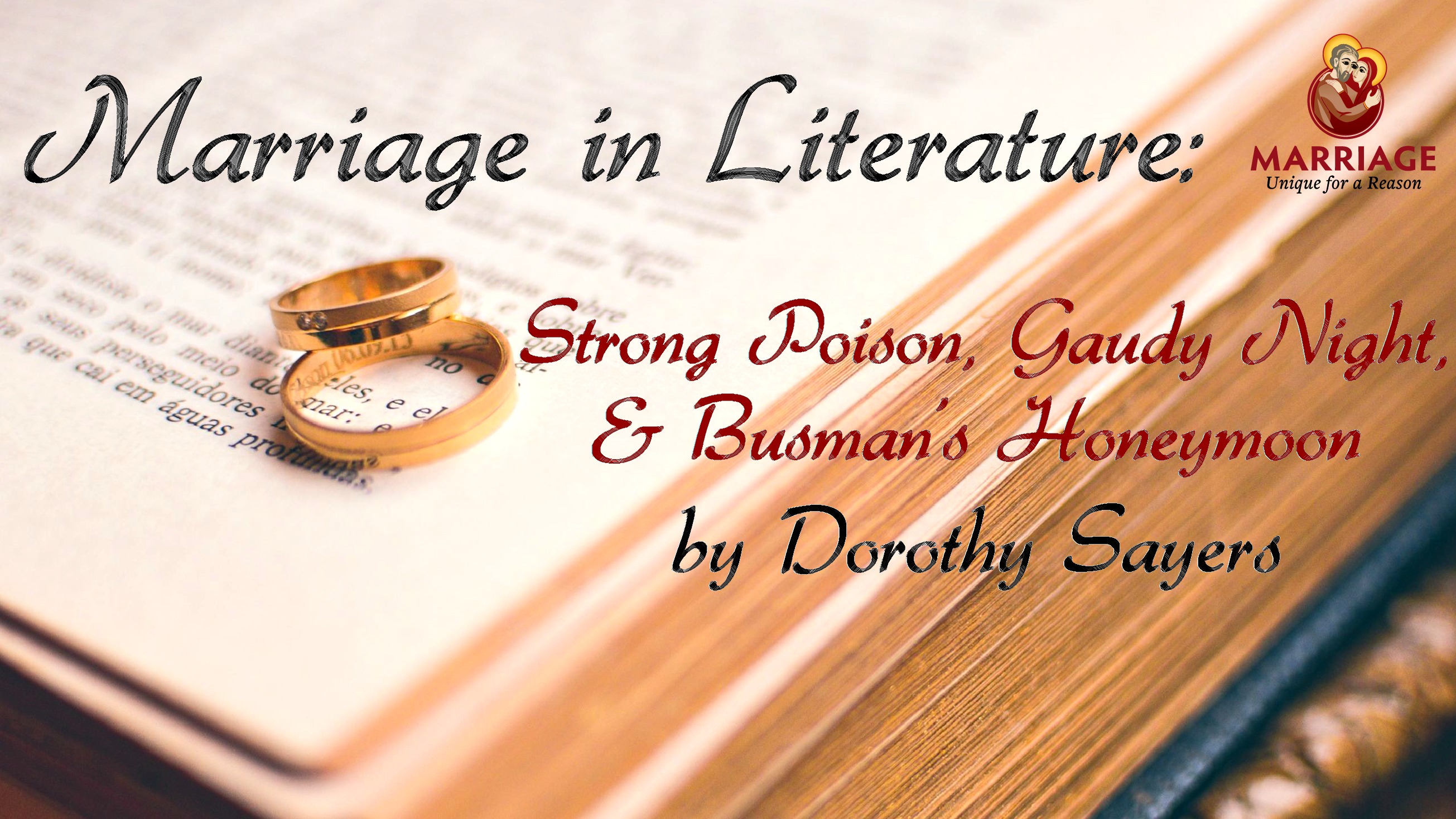Strong Poison, Gaudy Night and Busman’s Honeymoon: Dorothy Sayers (published 1930, 1935, 1937)
Dorothy Sayers, a contemporary of C.S. Lewis, wrote a series of detective novels around the character Lord Peter Wimsey. Lord Peter is one of the most eligible bachelors in England until he meets Harriet Vane and becomes enamored of her. He meets her in Strong Poison, asks her to marry him [for the nth time] in Gaudy Night, and is finally married to her in Busman’s Honeymoon.
Strong Poison introduces the character of Harriet Vane in a rather unideal circumstance: she is on trial for the murder of her live-in boyfriend. The novel opens with the watertight case against her and Lord Peter’s offering to prove her innocence. Wimsey actually proposes to her the first time they meet, at the prison; she is duly unimpressed. Here are a few things we can learn from these Sayers’ mysteries:
- Love is, and must be, a free choice.
After a few cases and numerous outings with Lord Peter, Gaudy Night finds Harriet with a quandary. She values her independence and career, and fears that despite his protestations, Peter will want her to give them up. These fears are unfounded, as Peter demonstrates that he loves her just as she is over a period of six years. Harriet finally allows herself to love him as she watches him sleeping on the grass during a picnic. She looks at him while he cannot observe her; while he is vulnerable and simply Peter, rather than Lord Peter, the diplomat and “most eligible bachelor in England.” Knowing his love for her and his persistence, Harriet struggled against saying “yes.” She needed to know that it was her choice.
- Love delights in giving; receiving is also a gift of love.
Harriet sees a chess set in an antique store and loves it. It is expensive. She knows that Peter would be extremely happy to buy it for her, if she let him. It is a small turning point in their relationship because Harriet shows that she is willing to receive Peter’s generosity, which she has been holding at arms’ length. She has stubbornly refused to take any gifts or mention anything she might like to him. Sometimes it is almost harder to receive love than to give it.
- Marriage is a true partnership.
Before marrying Harriet, Peter had a number of “lovers,” but he had not loved those women; he had not cared whether they were happy with him. In marriage, “He felt himself at once ridiculous and omnipotent. He was exultant. He wanted to shout” (p. 293). Later, when Peter offers to give up investigating a case for her, Harriet says, “What kind of life could we have if I knew that you had become less than yourself by marrying me?” (p. 344). Peter points out that many women see changing a man as a “triumph”—that their husbands would do anything for them, even against their own judgment— some women see that as power. Harriet responds, “We won’t use it. If we disagree, we’ll fight it out like gentlemen. We won’t stand for matrimonial blackmail” (p. 344). After they talk their issue over, they agree not to use the word “possess” about one another. Peter says, “We can’t possess one another. We can only give and hazard all we have” (p. 362).
- Marriage gives each of the spouses a home in the other.
“And what do all the great words come to in the end, but that?—I love you—I am at rest with you—I have come home,” Peter says to Harriet (p. 327). This simple affirmation is tested in Busman’s Honeymoon when the couple faces a difficult situation and both are used to being alone. Peter acknowledges that he usually deals with things by himself. Harriet says she is the same way: “I like to crawl away and hide in a corner.” “‘Well,’ [Peter] said, with a transitory gleam of himself, ‘you’re my corner and I’ve come to hide’” (p. 443).

Leave a Reply